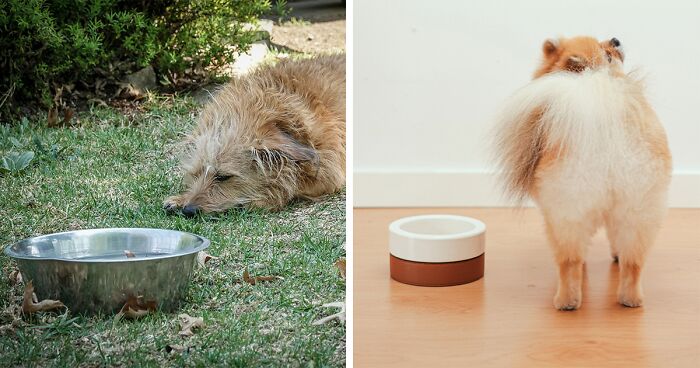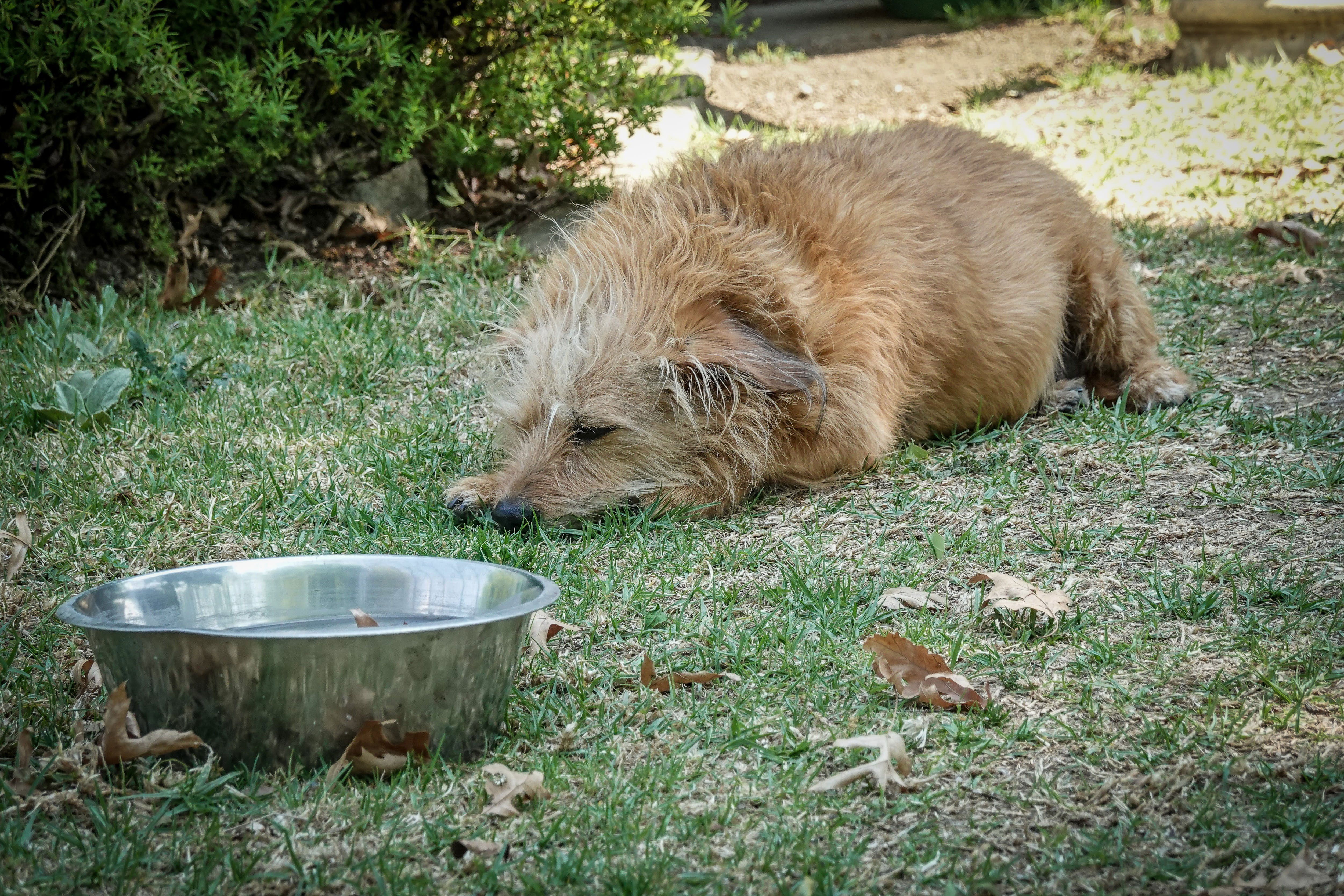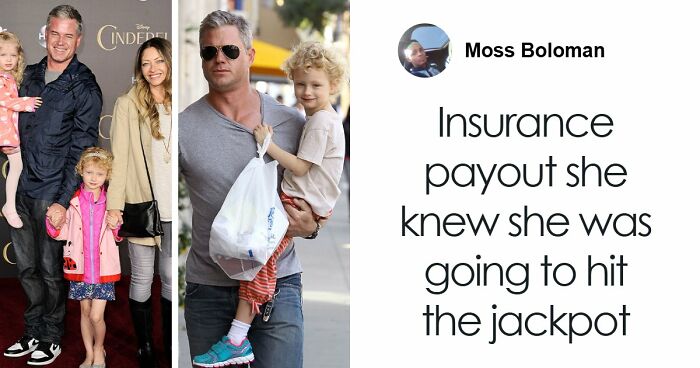Anyone who’s cared for a dog before has likely experienced a time when they don’t want to eat. Dogs can suffer from a loss of appetite for a variety of reasons, some of them require veterinary attention.
Disclaimer: Please refer to the content in this article as a guide only. If you think that there might be something wrong with your pet, then it’s best to take them to a veterinarian.
- A dog may stop eating due to mouth pain or nausea.
- Loss of appetite for 2+ days requires a vet visit.
- Dental issues can make dogs refuse food.
- Check food for contamination or expiry.
The information provided herein is for informational purposes only. Please refer to our disclaimer for more details..
What should I do when my dog won’t eat?
If your dog has gone off their food the first thing you should do is to check them thoroughly. If they’ll allow you to, have a look inside their mouth in case there is something inside that causes pain during eating, such as a foreign body or broken teeth.
It’s also good to notice whether they are drooling, or showing other signs that they may be feeling nauseous. If you don’t find anything obvious during your search, you might want to think about whether your dog may have eaten something they shouldn’t (such as rubbish or human food) or if they’ve already had enough to eat during the day.
If your pet is not showing any other signs (we’ll talk about those in the next section), then the next step is to check their food for any contamination or to see if it is out of date, especially if your dog normally has a good appetite.
If at any point, you notice other symptoms, and your dog hasn’t eaten, it’s best to take them to a vet, we’ll talk more about that in the next section.
When should I be worried about my dog not eating?
A dog going off their food is not always a reason for concern. Like us, they might be having an off day or feeling particularly fussy. If it seems normal otherwise, a dog skipping one meal in a day is unlikely to have a problem. However, there are a few occasions in which it’s best to exercise caution.
Firstly, if your dog’s loss of appetite is accompanied by any of the following symptoms, then it’s best to visit your vet for an examination:
- Vomiting.
- Diarrhea.
- Looking at their belly.
- Swollen abdomen.
- Not drinking – if your dog doesn’t drink water, then they can become dehydrated.
- Is in pain – for example, a dog with a painful abdomen might look at their belly.
If your dog seems free from the above symptoms but refuses to eat their food, it’s worth keeping a close eye on them. If after 2 days, they still don’t feel like eating, then it’s best to take them to your veterinarian.
Reasons your dog might not eat
There are a variety of reasons behind a change in your dog’s eating habits, so in this section, we’ll explain some reasons why your dog may have a lack of appetite.
Dental problems
Problems in a dog’s mouth, such as broken or missing teeth and painful gums can cause pain and hence, can mean that they don’t want to eat anything.
Veterinarians recommend taking your dog for a yearly dental check, to help spot problems such as gum disease early on, and prompt early treatment. This will also allow your veterinarian to assess whether your pet’s teeth might need cleaning.
Brushing your pet’s teeth every day is likely the best way to keep their mouth in tip-top condition. However, if your dog won’t tolerate this, then there is also a range of products, such as dental chews and special food to help keep your pet’s mouth clean.
Infectious diseases
Just like us humans when we get sick, our pets can also lose their appetite when they’re not feeling well. Loss of appetite is a non-specific sign of disease such as those caused by a dog’s immune system reacting to bacteria, viruses, or parasites. In this case, further diagnostics are needed to confirm a diagnosis.
If your dog isn’t eating, and has some of the following symptoms, they may be suffering from an infectious disease:
- Increased temperature.
- Vomiting.
- Diarrhea.
- Decreased energy.
Internal Diseases
Conditions that affect your dog’s internal organs such as their heart, liver, and kidneys, can mean that a dog suddenly stops eating. Just like the infectious diseases we talked about above, a dog’s appetite can be affected by their response to internal conditions.
Foreign bodies
Sometimes dogs eat things they shouldn’t, and sadly in some cases this can be very serious. Depending on what they’ve eaten and how much, they can have different symptoms, such as loss of appetite, vomiting, and diarrhea.
The term ‘foreign body’ is used by veterinarians to describe items other than food that a pet eats. For example, toys, packaging, and anything!
Sometimes foreign bodies pass through a dog however this largely depends on the shape, size, and amount eaten. In other cases, they can become stuck, and require urgent veterinary attention.
If you have a suspicion that your dog has eaten a foreign body, then it’s important to take them to a veterinarian as soon as possible. Your veterinarian will most likely take an x-ray to look for the foreign body, and if they find one, talk to you about how to proceed.
Gastric Dilatation and Volvulus
Inappetence can be a symptom of a life-threatening condition called gastric dilatation and volvulus. In this situation, a dog’s stomach becomes full of gas (‘gastric dilatation’) and bloated. In some cases, the stomach then twists on its axis and blocks anything from entering or leaving (‘volvulus’).
As the stomach twists, it affects a dog’s circulation, and even progress to shock or the stomach bursting open. It requires emergency surgery to treat and is important to seek veterinary attention immediately.
If your dog isn’t eating, seems to have pain in its stomach, and has a gassy abdomen, it’s best to call your veterinarian.
Picky eater
If you’re sure that there’s nothing wrong with your pet, then it could just be that your dog is just being picky. Picky eating habits in dogs can be brought on by a few things such as:
- Disturbed mealtimes – for example, due to noise, other pets, or family members. It’s best to keep your dog’s food bowl and water bowl in a calm place, where they can enjoy their food in peace.
- A change in food – A dog might not like their new food and it could cause them to stop eating. We’ll talk more about how to change your dog’s food correctly later. Moving the food to another location or different food containers may also cause a dog to refuse their food.
- Medication – if your dog is sick and taking medication, then it may be that your dog has learned to avoid their food because they don’t want to eat the prescribed medicine you’ve hidden inside! If this is the case, then you’ll likely have to try another option.
- Too many treats – if your dog has had an especially nice day, with lots of yummy snacks, then they might eat less because they’re already full.
- Anxiety – sometimes a dog might not want to eat without their favorite person.
Medication side effects
If your dog has gone off their meal and has recently been prescribed medication by a vet, it could be that it’s a side effect of the medicine. Contact your veterinarian if you think this could be the case.
Psychogenic reasons
For some of our furry friends, a change in appetite can be related to stress or environmental changes. For example, if your dog is particularly fixated on you, they might not be interested in their meals unless you are present.
Separation anxiety and changes in a dog’s home environment are also things that can affect their mealtime habits.
How long can a dog go without eating?
According to the American Kennel Club, if your dog doesn’t eat for two days, you need to call your veterinarian. Although it’s thought that dogs can theoretically go for around three days without eating, it’s best to seek advice early on.
Waiting too long can cause their condition to become worse, and can decrease the chances of a successful recovery.
How do I get my dog to eat their food?
If your dog is refusing to eat and you’re sure that nothing is wrong medically, then you can try some of the following:
- Increasing the temperature – Adding some warm water can make your dog’s food a little easier and more yummy to eat, especially if they have problems with their teeth and you feed kibble. You can also warm it up in the microwave.
- Add something yummy – For example, mixing dry food and wet food or canned food can stimulate your dog’s appetite. You could also try adding a small amount of dog-safe broth to their food as well. Mixing dry and wet food can make food such as dry kibble more appealing.
- Hand feeding – feeding a dog by hand might encourage dogs who like attention.
How do I introduce new dog food to my dog?
If you’re thinking of introducing a new food or incorporating another food into your dog’s diet, then you’ll want to do it slowly. This is to help them get used to it and decrease the chances that it will upset their stomach. Veterinarians recommend, gradually incorporating the different foods into their old food over a week.
Introducing new food too quickly to your dog, can upset their stomach or mean that your dog refuses to eat.

 Dark Mode
Dark Mode 

 No fees, cancel anytime
No fees, cancel anytime 



 Image credits:
Image credits:  Image credits:
Image credits: 










































3
0